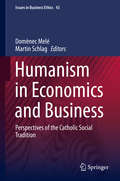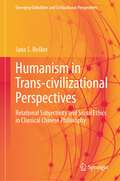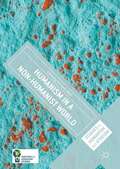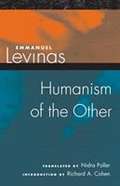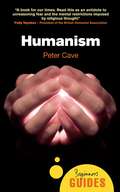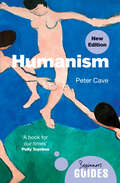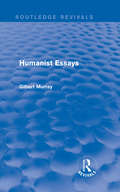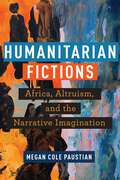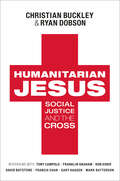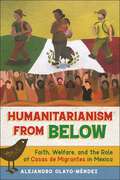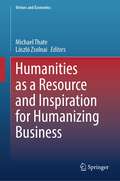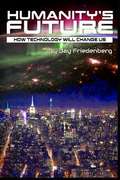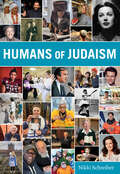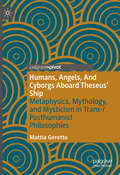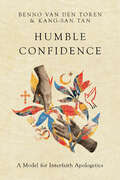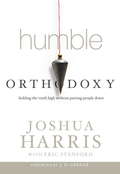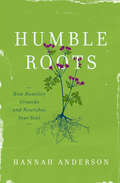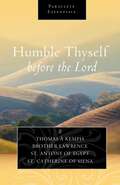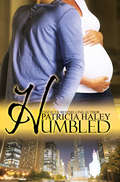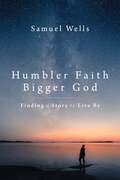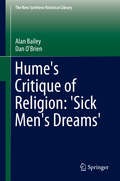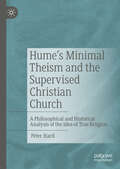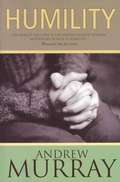- Table View
- List View
Humanism in Economics and Business
by Martin Schlag Domènec MeléThis book offers different perspectives on Humanism as developed by Catholic Social Teaching, with a particular focus on its relevance in economics and business. The work is composed of three sections, covering what is meant by Christian Humanism, how it links with economic activity, and its practical relevance in the business world of today. It reviews the historical development of Christian Humanism and discusses the arguments which justify it in the current cultural context and how it contributes to human development. The book argues that the current recognition of human dignity and the existence of innate human rights are both ultimately rooted in Christian Humanism. It sets out the importance of the concept for economic activities, and how Christian Humanism can serve as a metaphysical foundation and ethical basis for a social market economy. Applying Christian Humanism to business leads to the centrality of the person in organizations and to seeing the company as a community of persons working together for the common good. Three thought-provoking case studies illustrate the wide-reaching positive impacts of applying Christian Humanism in the organization.
Humanism in Trans-civilizational Perspectives: Relational Subjectivity and Social Ethics in Classical Chinese Philosophy (Emerging Globalities and Civilizational Perspectives)
by Jana S. RoškerThis book introduces into the current global ethics debate models of humanism developed in classical Chinese traditions, which have not yet been comprehensively presented to Western scholarship or integrated into the framework of global discourses on social ethics and morality. It creates new paradigms for an understanding of humanism that meets the demands of our time. It begins by presenting European descriptions and critical assessments of this discourse, and then moves to an exploration of humanistic ideas shaped through historical developments in Asia, with a focus on the Chinese tradition. In this sense, the book is written from a transcivilizational perspective. The methods used in the research transcend---that is, surpass and overcome---the rigid, isolating, and essentialist concept of civilization. At the same time, the book points to the possibility of transformation through the exchange of knowledge and ideas between different civilizations. Within this framework, the book starts from the assumption that the ontology of civilizations and cultures is not based on immutable substances, but on the relations between different factors that constitute them as categories. The transcivilizational perspective rooted in transcultural dialogues between philosophies that originated in different cultures and civilizations is particularly valuable because of the globalized world in which we live today. This means that the problems that affect people in different parts of the world and the issues that are embedded in different geopolitical and developmental frameworks also affect all of humanity. This book is of particular interest to scholars and students of global ethics, globalization, Asian philosophy and Sinology.
Humanism in a Non-Humanist World (Studies in Humanism and Atheism)
by Monica R. MillerThis book brings together a diverse and wide-ranging group of thinkers to forge unsuspecting conversations across the humanist and non-humanist divide. How should humanism relate to a non-humanist world? What distinguishes “humanism” from the “non-humanist?” Readers will encounter a wide-range of perspectives on the terms bringing together this volume, where “Humanism” “Non-Humanist” and “World” are not taken for granted, but instead, tackled from a wide variety of perspectives, spaces, discourses, and approaches. This volume offers both a pragmatic and scholarly account of these terms and worldviews allowing for multiple points of analytical and practical points of entry into the unfolding dialogue between humanism and the non-humanist world. In this way, this volume is attentive to both theoretically and historically grounded inquiry and applied practical application.
Humanism of the Other
by Richard Cohen Emmanuel Levinas Nidra Poller<p>In Humanism of the Other, Emmanuel Levinas argues that it is not only possible but of the highest exigency to understand one's humanity through the humanity of others. Based in a new appreciation for ethics, and taking new distances from the phenomenology of Hegel, Heidegger, Husserl, and Merleau-Ponty, the idealism of Plato and Kant, and the skepticism of Nietzsche and Blanchot, Levinas rehabilitates humanism and restore its promises. <p>He expresses disappointment with the revolutions that became bureaucracies and totalitarian governments, and the national liberation movements that eventually led to oppression and international wars. Defining the human as subject, ego, synthesis, identification, cognition, and mood all too easily lead to subjugation, persecution, and murder. <p>Painfully aware of the long history of dehumanization which reached its apotheosis in Hitler and Nazism, Levinas does not underestimate the difficulty of reconciling oneself with another. The humanity of the human, Levinas argues, is not discoverable through mathematics, rational metaphysics or introspection. Rather, it is found in the recognition that the suffering and mortality of others are the obligations and morality of the self.</p>
Humanism: A Beginner's Guide (Beginner's Guides)
by Peter CaveWhy should we believe in God without any evidence? How can there be meaning in life when death is final? Does a Godless universe imply moral relativism? With adherents including Einstein, Freud, Philip Pullman, and Frank Zappa, and often described as the thinking person's religion, Humanism aims to make sense of such questions by appealing to shared human values, rationality, and tolerance. This lively and provocative book is essential reading for atheists, agnostics, freethinkers, rationalists, sceptics, and believers alike. Peter Cave is a writer, presenter, and lecturer in philosophy at The Open University and City University, London.
Humanism: A Beginner's Guide (updated edition) (Beginner's Guides)
by Peter CaveLife does not become empty and meaningless in a godless universe. This is the contention at the heart of humanism, the philosophy concerned with making sense of the world through reason, experience and shared human values. In this thought-provoking introduction, Peter Cave explores the humanist approach to religious belief, ethics and politics, and addresses key criticisms. Revised and updated to confront today&’s great crises – the climate emergency and global pandemics – and the future of humanism in the face of rapid technological advancement, this is for anyone wishing to better understand what it means to be human in the twenty-first century.
Humanist Essays (Routledge Revivals)
by Gilbert MurrayFirst published in 1964, this is a short collection of both literary and philosophical essays. Whilst two essays consider Greek literature written at the point at which the Athenian empire was breaking apart, another group explore the background from which Christianity arose, considering Paganism and the religious philosophy at the time of Christ. These, in particular, display Gilbert Murray’s ‘profound belief in ethics and disbelief in all revelational religions’ as well as his conviction that the roots of our society lie within Greek civilization. Finally, there is an interesting discussion of Order and the motives of those who seek to overthrow it.
Humanitarian Fictions: Africa, Altruism, and the Narrative Imagination
by Megan Cole PaustianHumanitarianism has a narrative problem. Far too often, aid to Africa is envisioned through a tale of Western heroes saving African sufferers. While labeling white savior narratives has become a familiar gesture, it doesn’t tell us much about the story as story. Humanitarian Fictions aims to understand the workings of humanitarian literature, as they engage with and critique narratives of Africa.Overlapping with but distinct from human rights, humanitarianism centers on a relationship of assistance, focusing less on rights than on needs, less on legal frameworks than moral ones, less on the problem than on the nonstate solution. Tracing the white savior narrative back to religious missionaries of the nineteenth century, Humanitarian Fictions reveals the influence of religious thought on seemingly secular institutions and uncovers a spiritual, collectivist streak in the discourse of humanity. Because the humanitarian model of care transcends the boundaries of the state, and its networks touch much of the globe, Humanitarian Fictions redraws the boundaries of literary classification based on a shared problem space rather than a shared national space. The book maps a transnational vein of Anglophone literature about Africa that features missionaries, humanitarians, and their so-called beneficiaries. Putting humanitarian thought in conversation with postcolonial critique, this book brings together African, British, and U.S. writers typically read within separate traditions. Paustian shows how the novel—with its profound sensitivity to narrative—can enrich the critique of white saviorism while also imagining alternatives that give African agency its due.
Humanitarian Jesus: Social Justice and the Cross
by Ryan Dobson Christian BuckleyA resurgence of the Social Gospel is energizing many evangelicals, but what does the Bible say about the role of humanitarian works in the Christian life? As new covenant believers, Christians are called to a specific central task: to be ministers of God's message of salvation for sinners. At the same time, the New Testament justifies nearly every concern of the revitalized Social Gospel. Care for the poor and needy, reconciliation of social and racial divisions, and nurture for the sick and abused -- all can be biblical and Christ-honoring activities. Ryan Dobson and Christian Buckley have a message for believers on either side of the battle lines hardening around today's Social Gospel. To those on the Religious Left, they say: "Don't forget that Jesus Christ died to save sinners, not to bring about political change." To those on the Religious Right, they say: "Don't forget that Jesus spent much of his time helping the sick, the poor, and the needy." A corrective and a call to action all in one, Humanitarian Jesus shows that evangelism and good works coexist harmoniously when social investment is subservient to and supportive of the church's primary mission of worship, evangelism, and discipleship. In accessible and non-academic style, Dobson and Buckley outline the biblical case for humanitarian concern. They also engage the topic through interviews with leading Christian thinkers, activists, and humanitarian workers -- including Franklin Graham, Gary Haugen, Ron Sider, Tony Campolo, and many more -- seeking to define a broadly biblical approach to good works that all Christians can join hands around.
Humanitarian Jesus: Social Justice and the Cross
by Ryan Dobson Christian BuckleyA resurgence of the Social Gospel is energizing many evangelicals, but what does the Bible say about the role of humanitarian works in the Christian life? As new covenant believers, Christians are called to a specific central task: to be ministers of God's message of salvation for sinners. At the same time, the New Testament justifies nearly every concern of the revitalized Social Gospel. Care for the poor and needy, reconciliation of social and racial divisions, and nurture for the sick and abused -- all can be biblical and Christ-honoring activities. Ryan Dobson and Christian Buckley have a message for believers on either side of the battle lines hardening around today's Social Gospel. To those on the Religious Left, they say: "Don't forget that Jesus Christ died to save sinners, not to bring about political change." To those on the Religious Right, they say: "Don't forget that Jesus spent much of his time helping the sick, the poor, and the needy." A corrective and a call to action all in one, Humanitarian Jesus shows that evangelism and good works coexist harmoniously when social investment is subservient to and supportive of the church's primary mission of worship, evangelism, and discipleship. In accessible and non-academic style, Dobson and Buckley outline the biblical case for humanitarian concern. They also engage the topic through interviews with leading Christian thinkers, activists, and humanitarian workers -- including Franklin Graham, Gary Haugen, Ron Sider, Tony Campolo, and many more -- seeking to define a broadly biblical approach to good works that all Christians can join hands around.
Humanitarianism from Below: Faith, Welfare, and the Role of Casas de Migrantes in Mexico
by Alejandro Olayo-MéndezChallenges the definition of humanitarian aidAside from being one of the most important migration corridors in the world, Mexico is becoming an immigrant destination itself, with more and more migrants deciding or needing to stay in the country after failing to enter the United States. In the absence of state aid, migrant shelters have emerged as an informal welfare system for migrants, asylum seekers, refugees, and deportees in Mexico. Largely run by faith-based humanitarian organizations, these shelters have grown significantly in recent years.Humanitarianism from Below examines the significance of these casas de migrantes (migrant shelters) in the migration process in Mexico. The book also reviews the role of faith-based humanitarian organizations, whose engagement with migrants is perceived more as charity work than professional humanitarian work. The volume argues that faith-based humanitarian organizations’ work challenges traditional understandings of what counts as humanitarian aid. It makes the case that in order to understand the full ecology of migration, we need to understand not only how large organizations like the Red Cross work, but also how these smaller and local entities with fewer resources interact with migrants on their journeys. Most migration research tends to focus on its impact within home countries or in destination contexts, rarely focusing on the actual migration process, including the interactions that influence the course of the migration journey itself. In conducting this research, Alejandro Olayo-Méndez traveled along migrant routes several times in order to gain knowledge about how migrants move and how they interact with the migrant shelters. He offers a detailed look at the experiences and challenges of casas de migrantes in Mexico, situating these faith-based shelters as an integral part of Mexico’s humanitarian ecosystem.
Humanities as a Resource and Inspiration for Humanizing Business (Virtues and Economics #7)
by László Zsolnai Michael ThateThis book highlights the relevance of the grand traditions of the humanities as an untapped resource for business-world problems. In a time where the humanities are viewed as in decline or in threat of collapse altogether, this book enacts and extends the best of the humanities toward prevailing challenges within the complex realities of our current cultural moment. The book presents how the humanities can contribute to humanizing business and management. It explores and discusses various ways to integrate the views and approaches of the humanities in business and management research, practice, and education responding to the unprecedented challenges of the Anthropocene. The relations between humanities and social sciences is also discussed, as models and theories of business and management are based on insights of social sciences. The book is an outcome of the “Humanities for Business” project of Princeton University Faith and Work Initiative, the European SPES Institute, Leuven, and the Business Ethics Center of Corvinus University of Budapest. It is of great value to researchers, students, policy makers and research institutions interested in using humanities for renewing and humanizing business and management.
Humanity's Future: How Technology Will Change Us
by Jay Friedenberg[from the back cover] "Humanity's Future examines the psychological and social impact or likely Future events related to advanced technology. Will humanity Feel useless in a Future where most tasks are automated and robots do all the work? Will society experience alienation and angst, collapsing into a state of decadence and corruption? How might we improve ourselves, as technology advances in unprecedented ways? Who gets to decide? Can we advance civilization and eliminate genocide and war? Philosophical, scientific and pragmatic issues intertwine complexly here, and uncertainties abound, but Dr. Friedenberg unravels the various possibilities with a masterful clarity."
Humans of Judaism
by Nikki SchreiberAn inspirational, visual collection of Jewish stories, curated by the editor and founder of the popular social media brand @humansofjudaism. When her father passed away in 2013, Nikki Schreiber found comfort in her mourning by creating a social media space for sharing positive and uplifting Jewish stories. Thus was born @humansofjudaism, the hugely popular site with over 500,000 followers across all platforms. It is a space for sharing everything—personal stories, Jewish history, Holocaust education, support for Israel, and so much more. Humans of Judaism the book is a highly-visual, inspirational volume of 300 short Jewish stories—a mix of the most popular stories on @HumansofJudaism, as well as new content created just for the book. We meet the founder of Barbie, the founder of Zabar's, actress and model Gal Gadot, and so many others.Humans of Judaism is a celebration of Jewish life and community and a keepsake that Jews all around the world will want to own or gift to one another.
Humans, Angels, And Cyborgs Aboard Theseus' Ship: Metaphysics, Mythology, and Mysticism in Trans-/Posthumanist Philosophies
by Mattia GerettoThis book addresses the most suggestive themes of transhumanism and critical posthumanism by placing them in dialogue with classic problems of metaphysics, and with some great thinkers of the past (Bruno, Spinoza, and above all Leibniz). The main purpose of this comparison is to invite transhumanists and critical posthumanists to consider a highly complex problematic tradition rooted in the history of philosophy. This study also makes use of examples drawn from the history of mythology, angelology, and mysticism. At the same time, the book promotes dialogue between scholars of classical metaphysics and philosophy of religion, and the potential metaphysical/spiritual theories developed independently by transhumanist and posthumanist thinkers within an anti-dualist and naturalistic philosophical framework. The goal is to ‘enhance’ contemporary transhumanism and posthumanism by promoting the need to safeguard intelligence as a principle, without falling into the trap of a violent and egotistic metaphysics.
Humble Confidence: A Model for Interfaith Apologetics
by Benno van den Toren Kang-San TanToday's cosmopolitan, multicultural, and multifaith environments call for new approaches to apologetics.Benno van den Toren and Kang-San Tan provide a global, intercultural introduction to Christian apologetics. They present a model of apologetics as crosscultural dialogue and accountable witness, then explore how it plays out in relation to specific contexts and the major world religions—including primal religions, Hinduism, Buddhism, Islam, secularism, and late-modern spiritualities. Building on recent developments in apologetics and missiology, as well as their experience teaching internationally in Europe, Asia, and Africa, Van den Toren and Tan offer an approach that is conversational, patient, holistic, and embodied.Humble Confidence
Humble Orthodoxy
by Joshua Harris J. D. GreearWe don't get to choose between humility and orthodoxy. We need both. Orthodoxy, for the faithful, evokes what's cherished and beautiful and eternal. Yet in our day, orthodoxy is too often wielded like a weapon, used to bludgeon others with differing points of view. The word has become associated with behavior like argumentative, annoying, and arrogant. It's time for God's people to demonstrate both right thinking and right attitudes. We are called to embrace and defend biblical truth. But that truth includes repeated commands to love our neighbor, love our enemy, and be clothed in gentleness and respect. In Humble Orthodoxy, bestselling author Joshua Harris examines New Testament teachings about the calling of believers to a love-infused courage that ignores foolish controversies, patiently endures evil, and champions truth with generosity of spirit. Without this kind of humility, Harris asserts, we become like the Pharisees--right in our doctrine, but ultimately destroying the cause of truth with our pride.
Humble Roots: How Humility Grounds and Nourishes Your Soul
by Hannah AndersonFeeling worn thin? Come find rest. The Blue Ridge Parkway meanders through miles of rolling Virginia mountains. It&’s a route made famous by natural beauty and the simple rhythms of rural life.And it&’s in this setting that Hannah Anderson began her exploration of what it means to pursue a life of peace and humility. Fighting back her own sense of restlessness and anxiety, she finds herself immersed in the world outside, discovering a classroom full of forsythia, milkweed, and a failed herb garden. Lessons about soil preparation, sour mulch, and grapevine blights reveal the truth about our dependence on God, finding rest, and fighting discontentment.Humble Roots is part theology of incarnation and part stroll through the fields and forest. Anchored in the teaching of Jesus, Anderson explores how cultivating humility—not scheduling, strict boundaries, or increased productivity—leads to peace. &“Come unto me, all who labor and are heavy laden,&” Jesus invites us, &“and you will find rest for your souls.&” So come. Learn humility from the lilies of the field and from the One who is humility Himself. Remember who you are and Who you are not, and rediscover the rest that comes from belonging to Him.
Humble Roots: How Humility Grounds and Nourishes Your Soul
by Hannah AndersonFeeling worn thin? Come find rest. The Blue Ridge Parkway meanders through miles of rolling Virginia mountains. It&’s a route made famous by natural beauty and the simple rhythms of rural life.And it&’s in this setting that Hannah Anderson began her exploration of what it means to pursue a life of peace and humility. Fighting back her own sense of restlessness and anxiety, she finds herself immersed in the world outside, discovering a classroom full of forsythia, milkweed, and a failed herb garden. Lessons about soil preparation, sour mulch, and grapevine blights reveal the truth about our dependence on God, finding rest, and fighting discontentment.Humble Roots is part theology of incarnation and part stroll through the fields and forest. Anchored in the teaching of Jesus, Anderson explores how cultivating humility—not scheduling, strict boundaries, or increased productivity—leads to peace. &“Come unto me, all who labor and are heavy laden,&” Jesus invites us, &“and you will find rest for your souls.&” So come. Learn humility from the lilies of the field and from the One who is humility Himself. Remember who you are and Who you are not, and rediscover the rest that comes from belonging to Him.
Humble Thyself Before the Lord
by Brother Lawrence Thomas A. Kempis Saint Anthony of Egypt Catherine of Catherine of SienaIt is not easy to write about the importance of Christian humility. How does one exhort others to be humble, without sounding boastful oneself? The writings in this volume are classics of the genre, penned by four of the true experts on the Christian spiritual life: Thomas À Kempis, Brother Lawrence, St. Antony of Egypt, and St. Catherine of Siena.
Humbled
by Patricia HaleyExhausted by constant fighting, the Mitchell family is basking in the midst of an unexpected truce. Joel has fled to Chicago to escape his failed marriage and business ventures. Excited about climbing out of his pit of despair, Joel is eager to get divorced and start over. Tranquility is fleeting when he finds out that his wife, Zarah, is pregnant. Now he's faced with doing the right thing, but the only problem is he doesn't know what that is. Meanwhile, Zarah is willing to pine over Joel until he returns, certain the baby is going to solve their problems. Tamara, the fiery Mitchell heir who's obsessed with empowering women, refuses to watch Zarah grovel for the affection of an undeserving man, even if it is her brother. As Joel teeters with a decision, Tamara prods Zarah to take the reins. Tamara's commitment isn't purely altruistic. She wants to buddy up, gain allegiance, and ultimately undermine the family business. Is there hope for the Mitchell family as layers of strife begin to shed? Will God be able to soften their hearts?
Humbler Faith, Bigger God: Finding a Story to Live By
by Samuel WellsFinding a renewed Christian story in a time of skepticism and doubt Is Christianity just a fairy tale for the infantile? Or worse, a cruel fantasy—the perpetrator of terrible harm and the cause of endless conflict? At the very least, one path among many? Such questions reflect the skepticism of outsiders and the doubts of insiders—some perennial, some underscored by recent events and movements. The answer to these objections isn&’t a louder faith to shout them down—it&’s a humbler faith that points to a bigger God. Samuel Wells illustrates this through his generous, respectful, and earnest engagement with ten difficult questions about Christianity. In each case he portrays the traditional position and the skepticism of the modern age as two rival stories. Transcending both, he then offers a revitalized Christian story that better renders the radical, courageous, and vulnerable nature of authentic faith. Wells is unwaveringly honest about the failures of the institutional church and acknowledges many people&’s negative prior experiences of Christianity—making this a book for both Christians and non-Christians who have found the stories of their lives disrupted and now seek a fulfilling and truthful story to live by.
Hume's Critique of Religion: 'Sick Men's Dreams'
by Dan O'Brien Alan BaileyIn this volume, authors Alan Bailey and Dan O'Brien examine the full import of David Hume's arguments and the context of the society in which his work came to fruition. They analyze the nuanced natured of Hume's philosophical discourse and provide an informed look into his position on the possible content and rational justification of religious belief. The authors first detail the pressures and forms of repression that confronted any 18th century thinker wishing to challenge publicly the truth of Christian theism. From there, they offer an overview of Hume's writings on religion, paying particular attention to the inter-relationships between the various works. They show that Hume's writings on religion are best seen as an artfully constructed web of irreligious argument that seeks to push forward a radical outlook, one that only emerges when the attention shifts from the individual sections of the web to its overall structure and context. Even though there is no explicit denial in any of Hume's published writings or private correspondence of the existence of God, the implications of his arguments often seem to point strongly towards atheism. David Hume was one of the leading British critics of Christianity and all forms of religion at a time when public utterances or published writings denying the truth of Christianity were liable to legal prosecution. His philosophical and historical writings offer a sustained and remarkably open critique of religion that is unmatched by any previous author writing in English. Yet, despite Hume's widespread reputation amongst his contemporaries for extreme irreligion, the subtle and measured manner in which he presents his position means that it remains far from clear how radical his views actually were.
Hume's Minimal Theism and the Supervised Christian Church: A Philosophical and Historical Analysis of the Idea of True Religion
by Péter HartlIn this book, Péter Hartl offers a novel and comprehensive interpretation of David Hume’s philosophy of religion focusing on various notions of ‘true religion’ in Hume’s overall philosophy and how these ideas relate to various early modern positions on religion, society and philosophy. The account consists of both critical and positive parts of Hume’s overall, nuanced position on theoretical, social and political aspects of religion and the philosophical criticism of religion. Hartl criticises the atheist and completely negative readings of Hume’s philosophy of religion. Instead of presenting Hume’s position as either a radical secularist or closet atheist, Hartl’s interpretation builds on the underdeveloped, positive and constructive parts of Hume’s account of (true) religion. For Hume, on the one hand, true religion is compatible with or even vindicates minimal theism, and it forms part of philosophy exemplifying intellectual virtues. On the other hand, Hume has a pragmatic stance on the role of religion in society, according to which the government should control religious institutions to reduce the power of church authorities but to retain some positive social effects of religion.
Humility
by Andrew MurrayAn exploration of the life and death of Jesus, a discussion of humility as the distinguishing feature of the discipleship of Jesus Christ, and teaching on how to die to self and live for Christ
